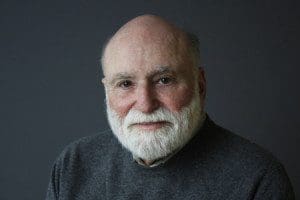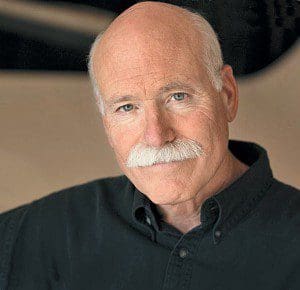Andrew Foster Altschul: Well, gentlemen, I said I would toss out something to get us started. I was thinking about that story that’s in both of your memoirs—The Duke of Deception and This Boy’s Life—about the summer in San Diego when, Geoffrey, you had just graduated from Princeton, and Toby, you were still in high school, you were maybe sixteen, and it was supposed to be a family reunion, the two of you and your dad. It didn’t quite work out as planned. Your dad ended up in an institution, and Geoffrey took his job at a defense contractor. The part of the story that’s so enjoyable is that you’ve both described how you had this writer’s colony of two going— Geoffrey was assigning Toby books to read and papers to write; Geoffrey had written a novel (that his professor had told him to destroy), and Toby was dead set on becoming a writer.Thinking back to that time, and to what you imagined for yourselves—did it look anything like the lives and careers the two of you have led?

Geoffrey Wolff: Well, first, if I may, I just want to correct a possible misapprehension about the nature of the “institution” my father was in. It was not like the Institute for Advanced Studies at Princeton! Not at all like that. He’d been conveyed to this institution by the police.
It’s quite wonderful, the beginning of all writers—anybody who’s decided that’s what they want to do. Nobody has any idea what it means. Not the vaguest idea what it means, except that they read books and they want to make them. And Toby and I both had spent, under quite different circumstances, a lot of our youth in libraries. Our mother borrowed books for us from the time we were very young, and that’s kind of what we had in common. I hate to think now what our lives might have become had there been television to watch.

Tobias Wolff: That was a great summer, in its way. I was fifteen and I was about to go back east to a boarding school, where I’d gotten a scholarship. I was completely unprepared for this school. Geoffrey took me under his wing and taught me, really gave me the beginnings of an understanding of what it is to write—because I had none, really. I had some very nebulous idea of writing, but nothing that I was actually fastened on. I liked to read a lot. I wrote knock-off stories of things that I was reading.But I think it had everything to do with the fact that Geoffrey encouraged me to think of this as a serious way of living—the way he taught me to read and open things up and think about them, and the kind of care that you brought to the writing of sentences. It became not just a kind of academic thing but—how can I put it?—a kind of exercise of the spirit.
By the time that summer was over, I wanted to be a writer, and I’ve never really wanted to be anything else since then.
You know, it is what you’ve talked about, Andrew, the unimaginability of where you might end up in the future: Geoffrey and I for years sat around talking about books and writing, and about our hopes as writers—always, I have to say, somewhere in the pit of my stomach I thought, “We’re building castles in the air—or I’m building castles in the air.” The fact that somehow I was able to dredge some books out of myself and actually be up here talking to my brother as a writer seems miraculous to me.
GW: I think something that is too seldom emphasized is the way teaching works, particularly in English and literature, the extent to which it’s this wonderful alchemy which is really monkey-see-monkey-do. I’d just graduated from college, where I’d had great professors—one in particular, R.P. Blackmur, a poet,who was my advisor and was very deeply read and had very high expectations. He was a so-called New Critic, and he was a close reader and insisted that we be very close readers. And when I graduated and joined Toby within a couple of weeks out in California, I had just left being under his influence. I’m certain if I could record our conversations I’d be mortified to find transcripts of R.P. Blackmur’s lectures in there.
So a lot of it was not experience so much as that I’d been inspired by somebody. When Toby and I were together that summer, I was about to go teach at the end of that summer, my first teaching job—my first real job—and I’m sure I used Toby as practice, as a sort of batting cage. When I left Toby, I went to Turkey to teach. And the students that I taught all spoke English. But the things we taught them in the English department were the things we were interested in. So it was Alexander Pope, it was Milton, it was Keats—it was completely arbitrary. And they’d come out of eastern Turkey, and suddenly were told, “You’re going to have Pope down by the end of the week!” A lot of them went forth…I know some of these kids are teachers now. God knows what they’re telling their kids about Alexander Pope.
I think this is the most wonderfully wholesome act of either ripping off, or mimesis, in the way Aristotle means it. Something that I know now registered on Toby must have been much less deeply understood by me at the time than we seem to understand it now.
AFA: There’s a famous story about your mother, when she was asked to comment after This Boy’s Life came out, maybe six or seven years after The Duke of Deception, she was asked what she thought about it all. And she said something to the effect of, “I feel as though I got run over by a train that was headed south, and then it came north and ran me over again.” I was wondering about the two of you, seeing yourselves in each other’s work—maybe even turning up in the fiction sometimes—what has that experience been like? Have you had conversations about this?
GW: Oh, yeah, we’ve had lots of conversations. And I have to say they’ve only been an absolute joy for me, because the more we talk the closer we understand each other. But our experiences in childhood only rarely overlapped, so there are very few things that we could recollect in common or even dispute: was the collie named Shep or Shepard?, for example. So I learned about not only my mother and the people she was close to after she and my father were separated, but I learned about Toby, too. And I also learned what their point of view was on my life and my father’s.
So Toby and I have really educated each other in family history. And what we had in common most was our mother, and our mother, about these two books, was just amazing. She was so smart in her response, at least to me—there were many things in my book that must have been hurtful to her, that I know were hurtful to her. But she never argued about the integrity of my memory, although she may very much have disagreed with it. She only corrected me on facts that she knew when she read the manuscript: “That isn’t the address where we lived,” or “We didn’t live there at that time,” or “It didn’t cost that much to rent.” And she was right about seventy percent of the time, as it turned out. But she said in this stunning end of a letter that she wrote me when she returned the manuscript, she said, “I wish it were”—using the subjunctive—“I wish it were a portrait of a perfect mother, but then I wasn’t a perfect mother, but then who was?” And I cannot tell you how much I admired that prose, and the sentiment behind it.
TW: She was pretty unsentimental in her way of reading these books. My heart was in my throat when I gave her my manuscript. I didn’t want her to be hurt by anything in there. But, on the other hand, if you’re telling a story like this you have to tell it as you remember it. And I certainly wrote it in love—andshe got that, she got that it was written in love. And she said once, “Well, if I’d known that both my sons were going to be writers I might have lived a little differently.” Well, again: Who wouldn’t?
She was kind of feckless. She had terrible taste in men. Oh, my God: blowhards! We were laughing a couple of days ago about one of our step-fathers, Frank. I mean, he claimed that he was on the Bataan Death March—while he was also fighting in Europe! And winning the war there. He claimed that he’d been tapped to be head of the CIA at one point. I’ll never forget when he said, “Well, I woke up one morning, and goddamn if they hadn’t elected me mayor of Cranston, Rhode Island, and I wasn’t even running!” He’d say anything, it was just amazing. There was a parade of these guys. So I had a heart-to-heart with my mom about all this and she said, “I would have felt funny if you’d prettied up the portrait”—that wasn’t her term, but, kind of airbrushed her portrait. She said, “I would have felt like you didn’t really accept me the way I am.” And I thought, “Boy, I hope I have that kind of sophistication when my writer daughter turns me into a public disgrace.”
She was very honest, she was very direct. She did have a very factual kind of memory. She did call me out on a couple of things. I didn’t agree with her—I have a pretty good memory, too. I often just stuck to my own memory of things, because that’s what a memoir is: your memory of things.
But one thing that Geoffrey does that I certainly tried to do in the writing of my book is: the points of anyone’s life that are most interesting and telling and significant are points of intersection with the lives of other people. And so you necessarily are exposing other people, who may not and almost certainly do not wish to have that kind of exposure, in the writing of a memoir. And you can either accept that condition or not write one. If you are going to accept the condition, I do think that the debt you take on is to put yourself under the same kind of lens that you put everybody else under, that you do not see yourself as some angel flying above this fallen creation. You’re in it. You’re part of this foul rag-and-bone shop of the heart, you’re complicit in the stories that you’re telling. You also have to be careful that you don’t overload that, too, and say, “Look what a good person I am to tell you what a bad person I used to be,” that kind of thing. You have to be as honest as you can about the person you were when you’re telling a story of that kind.
